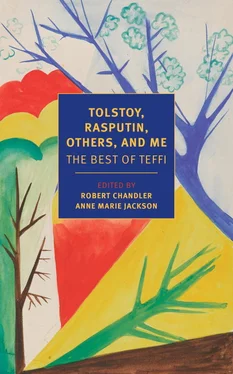That evening we lit the candles on the tree. We invited Motka, and Lyoshka, the laundrywoman’s son. And Valya was so sweet and affectionate that my hard heart began to melt. I lifted her up in my arms and I showed her the angel.
“An angel?” she said in her businesslike way. “Give it to me.”
I gave it to her.
She looked at it for a long time, stroking its wings with one finger.
I saw that she liked the angel, and I felt proud of my daughter. After all, she hadn’t paid the least attention to the stupid clown, even though it was so brightly coloured.
Valya suddenly bent forward and kissed the angel. My darling girl!
At that moment Niushenka, one of our neighbours, arrived. She had brought a gramophone with her. We began to dance.
Really I ought to hide the angel, I thought. It’ll only get broken… But where was Valya?
Valya was standing in the corner behind the bookshelf. Her mouth and cheeks were smeared with something raspberry-coloured. She looked troubled.
“What is it, Valya? What’s the matter? What’s that in your hand?”
In her hand were the mica wings, crumpled and broken.
“It tasted a bit sweet,” she said.
I must wash her at once, I thought. I must scrub her tongue. That was what mattered—the paint might be poisonous. She seemed, thank God, to be all right. But why was I crying as I threw the broken mica wings in the fire? How very silly of me! I was crying!
Valya stroked me indulgently on the cheek with her soft hand, which was warm and sticky, and tried to comfort me:
“Don’t cry, you silly. I’ll buy you some money.”
1926 Translated by Rose France
1
On that morning it was always sunny.
The weather was always bright and cheerful. So, at least, both Liza and Katya remembered it for the rest of their lives. [1] In this story Liza represents Teffi herself, while Katya is Teffi’s younger sister Lena.
On that morning, Nanny would always dress them in new, light-coloured dresses. Then she would go to the “big” dining room, where the adults were drinking tea, and come back up again with half a hard-boiled egg, a piece of kulich and a piece of paskha [2] Kulich is a sort of spiced Easter bread and paskha is a curd cheesecake.
for each of them.
Nanny herself always broke her Lenten fast early in the morning when she came back from the Liturgy. She would have cream with her coffee, and the children knew that she would grumble all day and start to feel out of sorts by evening.
The hard-boiled egg would always get stuck somewhere in Liza’s chest and they would have to pummel her hard on the back to dislodge it.
The housekeeper, who on that day always smelt of vanilla, would come to wish them a happy Easter.
And she would tell them the story of how, twenty years ago, the mistress of a certain house had made a baba [3] Baba is not only a colloquial Russian word for a woman but also a type of cake.
using beaten egg white, and how the baba had “fallen in the oven”. And the mistress had strung herself up from the shame of it.
Liza knew this story, but she could never work out which of the two women had strung herself up and which had fallen into the oven: the baba or the mistress? She imagined a huge blazing oven, like the “fiery furnace” in the holy pictures into which the three youths were thrown. [4] A reference to the biblical story of Nebuchadnezzar, King of Babylon: when Shadrach, Meshach and Abednego refused to worship him, he had them thrown into a fiery furnace.
And she imagined a great fat baba —the mistress—falling into the oven. In short, she couldn’t make head nor tail of it, but it was clearly something horrid, even though the housekeeper told the story cheerfully, with relish.
The housekeeper would also always reminisce about a certain August Ivanovich, a gentleman she had once worked for.
“Would you believe it—a German and all, but such a religious man he was! All through Holy Week he wouldn’t take a bite of meat. ‘It will taste all the better when I break my fast on Easter morning,’ he used to say. A German and all, but he would never sit down to Easter breakfast without ham on the table—not for all the world. That’s how religious he was!”
In the evening Liza remembered something very important, went along to her elder sister and said, “Last year, you told me you were already a growing girl, and I was still a child. But this year I fasted for Lent, so that means I’m a growing girl now too.”
Her sister turned away, annoyed, and muttered, “You may be a growing girl, but I’m a young lady. Anyway, you should be in the nursery. Go away, or I’ll tell Mademoiselle.”
Liza pondered these words bitterly. She would never catch up with Masha. In four years’ time she herself might be a young lady, but by then, Masha would already be an old maid. She would never catch up with her. [5] Masha represents Teffi’s elder sister Mirra Lokhvitskaya, later a well-known poet.
2
The church is crowded and stuffy. Candles splutter quietly in the hands of the worshippers. A pale blue blanket of incense smoke is spread out high in the dome. Down below—the gold of the icons, black figures and the flames of the candles. All around—black, candlelight and gold.
Liza is tired. She breaks off pieces of melted wax, rolls them into pellets and sticks them back onto the candle, noting how much of the Gospel the priest has read. The priest is reading well, clearly enough for Liza to hear him even though she is standing a long way back.
Liza listens to the familiar phrases but cannot concentrate. She is distracted by the old woman in front of her, who keeps turning round malevolently and piercing Liza with a cold stare, with a yellow-ringed eye like the eye of a fish. The old woman is afraid that Liza will singe her fox-fur collar.
Liza is also distracted by all kinds of other thoughts. She is thinking of her friend: fair, curly-headed Zina. Zina is like a bee—all honey and gold. Her bronze hair grows in tight curls. One summer, at the dacha, Zina had been sitting holding a little lapdog, and a woman coming past had said, “Humph, just look at that… poodle!” And in all seriousness Zina had asked, “Was she talking about me , or Kadochka?” Zina is silly, and so like a bee that Liza calls her Zuzu.
What is the priest reading about now? “And the second time the cock crew.” [6] A reference to Peter’s denial of Christ. During the Last Supper Jesus predicted that, before the cock crowed the following morning, Peter would deny all knowledge of him. Liza is attending the Holy Thursday service “The Twelve Gospels of the Passion of Our Lord and Saviour Jesus Christ”—a reading of twelve passages from the Gospels relating the betrayal, arrest, trial and crucifixion of Jesus. The service also includes a procession that re-enacts Christ carrying his cross to Golgotha.
How had it all happened? Night. A fire in the courtyard of the high priest. It must have been cold. People were keeping warm next to the fire. And Peter was sitting with them. Liza loved Peter; for her he always had a special place among the apostles. She loved him because he was the most passionate of them. She didn’t like to think that Peter had denied Christ. When they had asked him if he had been with Jesus of Nazareth, and he had not admitted it, it was only because he didn’t want to be driven away. After all, he had followed Christ into the high priest’s courtyard—he had not been afraid then.
Liza thinks of how Peter wept and of how he walked away “the second time the cock crew”, and her heart aches, and, in her soul, she walks side by side with Peter, past the guards, past the terrible, cruel soldiers, past the high priest’s servants, who look on with malevolent suspicion, and out through the gate and into the black, grief-stricken night.
Читать дальше












